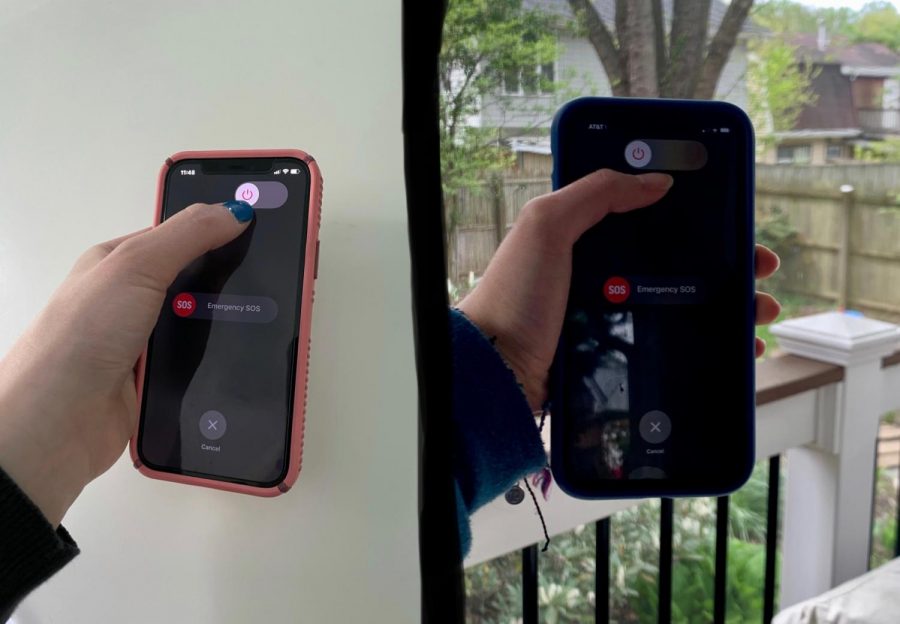24 hour digital detox challenges students to shut off their screens
Photo by Melissa Redlich and Sylvia Thompson
Two high school sophmores decide to challenge themselves by doing a 24 hour Digital Detox. Their opinions and thoughts are completely different, but shed light on the overuse of devices.
May 6, 2021
Experiencing life burnout? You are not alone. Screen usage has skyrocketed since the pandemic started, and not just in teens. Partaking in a digital detox could be a crucial step towards refreshing your mind. We participated in said experiment which entailed not being able to use your phone for a whole 24 hours.
In the beginning, Melissa believed that it would be easy to go a day without any screen time, while Sylvia thought the opposite. Read on to see how each individual was proved wrong, and if this challenge could benefit you as well.
Sylvia Thomson
Wake up, check my phone, eat breakfast. I did not realize how much my phone was part of my morning routine until I tried “detoxing.” I suspected going without my phone for 24 straight hours would be tough, so I invited some friends over to hang out on the day of the challenge. They were my source of entertainment for most of the day which helped keep me busy. I was also able to notice all of the times where they checked their phones (around 10 times every hour for each person). Those were the times where normally I would be looking at mine, as well.
I laid out a plan for my day the night before. I would do homework on my computer from 9:30 a.m. to 11 a.m. That was the only point in the day where I had contact with an electronic device. I hung out with friends from 11 a.m. to 5 p.m. Not carrying my phone around with me while doing various things with them forced me to be present in real-life interactions without any distractions, and surprisingly, it did not feel too strange.
I had to figure out something to do with myself once I got back home, though. Over quarantine, my attention span has exponentially decreased, so I find it embarrassing to say that I had to force myself to start a book I had initially intended to read over the summer. However, once I started, it was not hard to keep going. I also started a gratitude journal which I highly recommend if you are looking to calm some internal anxiety.
The biggest realization I had is that notifications are the bane of my existence. The sound of my ringer going off immediately triggers me to reach for my phone. Even if my phone is on silent, this creates room for me to wonder if someone has tried to contact me. This was especially true when I was not allowed to look. I found myself wondering what was happening on my device several times throughout the day, especially when my company left.
I am an introverted person, so I am best able to recharge my mind when I am alone. Since my phone is usually the only other constant thing with me, I have always used it as my way to unwind. Recently, it has turned into the only way I have been able to relax, and reflecting back, I find that concerning. When I substituted time on my phone with reading a book, journaling and walking with friends, I was still able to loosen up, but in a healthier way.
Overall, going without my phone was not as hard as I thought it would be. Usually, my phone is an arm’s length away, but with this challenge, I was able to prove to myself that I did not need it 24/7. It was relaxing not checking up on my social media constantly. Even though my digital detox experience is now over, I wanted to integrate some aspects of the experiment into my daily routine. I have set time limits on my phone for my most used apps and have also gotten rid of Snapchat entirely.
I believe my phone was causing a sense of stress that I was unknowingly feeding. Baby steps such as charging your phone in another room, turning notifications off for select apps and/or having meals without your phone can be steps towards spending time off a screen.
Melissa Redlich
Wow. All I can say is 24 hours ago I powered off my phone and computer, shoved them into a cabinet down in my basement and walked right back up the stairs. Who knew that a ‘digital detox’ would be so hard?
I have never thought of myself as one of those people who is attached to their phones. (Spoiler Alert: It turns out I was really wrong). I rarely bring my phone to family functions, (unless I need it for safety reasons), and pride myself on this unattachment. (Again, I was totally mistaken.) So when 10:00 a.m. hit on a Friday when we had no school, I expected it would be that difficult to be without my phone and computer.
The night before, I got everything in order: I turned in any homework that was due on Friday and treated myself to a movie, as a way to indulge before the challenge began.
Friday started off fine. At 9:00 a.m. I took an online math retake and then things started to go downhill. As said before, I locked up my devices in the basement to prepare for my new journey. I thought that the challenge would be easy. How hard could it be not to use my phone for 24 hours? I was so wrong. Without my phone, I could not listen to music on Spotify or FaceTime any of my friends. As an extroverted person, I thrive when I am with people. During COVID-19 my screen time has increased by multiple hours since I FaceTime my friends constantly. I know this is probably not a good habit, but I rationalize that I am living amidst a global pandemic and I have some leeway to do things that make me happy.
For Friday, I had previously scheduled a walk with my neighbor — who is also one of my very good friends. The walk was great, the weather was perfect and I was feeling pretty good when I walked back into my room an hour and a half later. This was until I realized that I had absolutely nothing to do. Nothing.
I stupidly had done all of my homework the night before, and now was absolutely, completely, utterly annoyed. I wrote in my notes that day, “I AM BORED,” which sums it up perfectly.
Quick background: I like to do things well and am a bit of a perfectionist. So, the fact that I almost considered quitting says something. However, thinking back on that day I realize that phones are truly essential for my everyday life. While I recognize that watching hours of “Pretty Little Liars” is not essential to daily life (or the best use of my time), my phone is in fact a necessity for my safety and to keep in touch with friends and family.
Yes, I did have a mental breakdown while lying on my floor that day, bored and frustrated, but I did learn a lot thinking back on it. Hindsight is 20-20, like most things in life.
Ending Statement
You will never know the impact something has on you until you try it. This was the first time either of us willingly participated in going a long period of time without our phones, and we are now able to apply some lessons from the challenge to our life in the future. The takeaway from your experience can be as small as stopping random browsing or watching TV less; it does not have to be drastic.
The basis of this article is to not only share our stories of the day, but to encourage others to be on their phone less. School curriculums these days are majorly dependent on the use of technology, making it difficult to manage the time that you are on your personal devices. However, it is important and impactful for your mind as well as your well-being to take a break from the glaring screens. Stop surfing Youtube and sign off of Instagram. It could be difficult going cold turkey, but if you ease into a less technologically focused lifestyle, each day will increasingly get easier.



